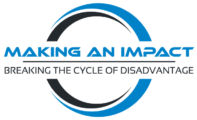Author: Walter Gilbert
Board Member at Large, Making An Impact
As a fourth-generation Floridian from a predominantly Black neighborhood, I’ve witnessed firsthand how disparities in access to information can disproportionately affect marginalized communities. For too many people, the lack of access to critical resources like food, housing, and healthcare isn’t just an inconvenience—it’s a barrier that perpetuates cycles of poverty and disenfranchisement. Access to information isn’t merely critical—it is empowering. It’s the bridge connecting individuals to the services that can help them meet their most basic needs and ultimately transform their lives.
Yet, this empowerment isn’t equally accessible to everyone. Across the country, systemic inequities have created a significant gap in access to essential information, particularly for individuals in lower-income neighborhoods and communities of color. This disparity is not just about who has access to technology or the internet; it’s about who is systematically excluded from the networks of support that can alleviate their struggles. Without timely and accurate information, many people are left to navigate a labyrinth of services without a map, making it even harder to improve their circumstances.
This is especially true for those living in marginalized communities, where literacy barriers, cultural differences, and historical mistrust of institutions can further compound the challenges of accessing information. When communities are excluded from these vital resources, the consequences can be devastating, whether it’s struggling to find a food bank, accessing affordable housing, or seeking healthcare.
Timely and accurate information is power and can make the difference between surviving and thriving. Resources have the potential to drastically improve lives—but only if people know how to access them. That’s where initiatives like the Making An Impact Basic Needs Resource Guide come in. By centralizing vital information in one easy-to-navigate location, the guide ensures that individuals from all walks of life—especially those from underserved communities—have the tools to find support when needed.
However, it’s important to recognize that no single solution will work for everyone. People have diverse preferences for how they receive information, and some may face additional barriers like language differences, technological access, or physical disabilities that prevent them from accessing resources online. This is why we need multiple avenues to ensure equitable access to information. Local initiatives, such as Making An Impact, are essential in meeting this need, as they take a community-centered approach to reach those who may otherwise be left behind. Making An Impact doesn’t just distribute information—they build trust, engage with community leaders, and meet individuals where they are, helping to bridge the gap between people and the resources they need to improve their quality of life.
Advocating for better access to information is a responsibility for all of us, and like Making An Impact, we all have a role to play in creating a more equitable society. We can ensure that no one is left behind by supporting efforts that center on inclusivity and reach marginalized communities.
Improving access to resources is key to breaking down systemic barriers and fostering a more equitable society. Equitable access to information isn’t just a nice-to-have—it’s a necessity for promoting resilience and empowering all communities.




